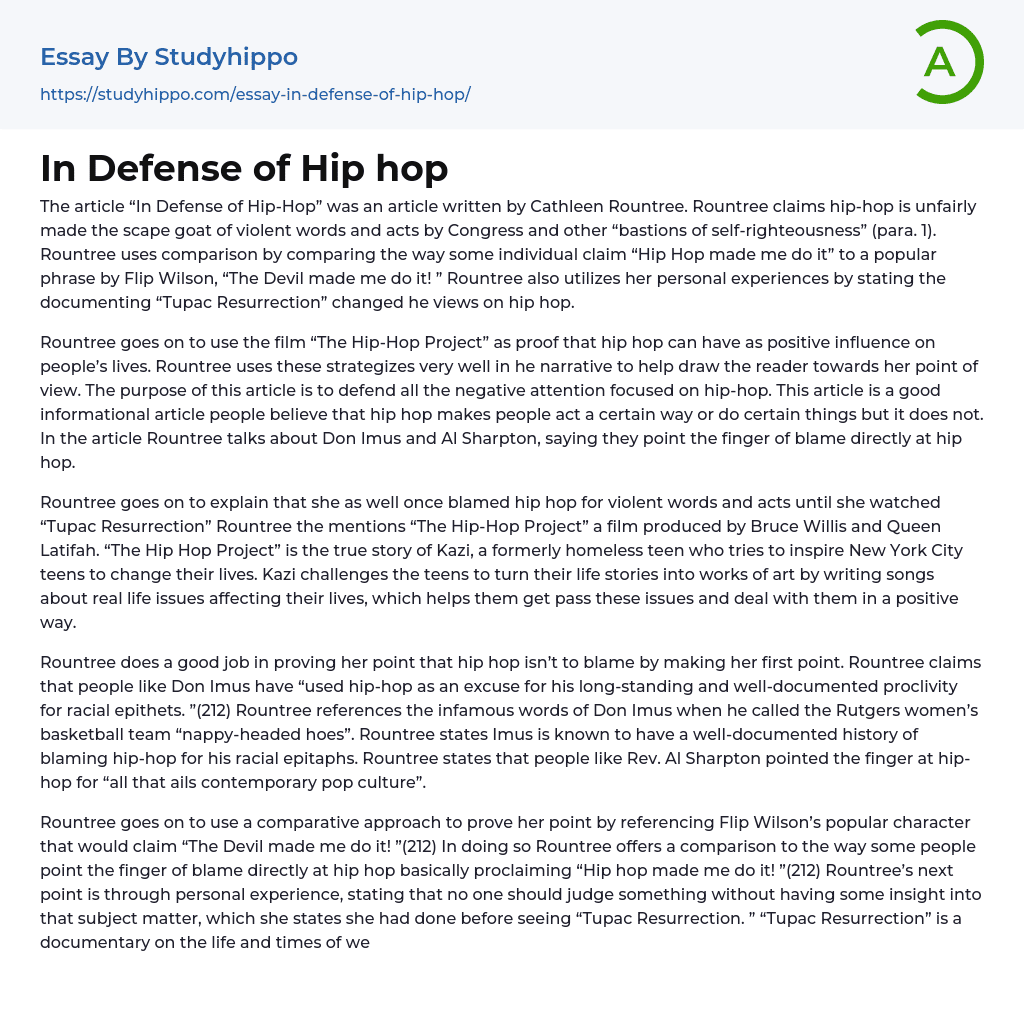In her article "In Defense of Hip-Hop," Cathleen Rountree highlights the unjust blame placed on hip-hop for promoting violence by various self-righteous entities, including Congress. Drawing a comparison, Rountree equates the statement "Hip Hop made me do it" with Flip Wilson's well-known phrase "The Devil made me do it!" Furthermore, she shares her own change in perspective after viewing the documentary "Tupac Resurrection."
Rountree utilizes the film "The Hip-Hop Project" as evidence to demonstrate the positive impact of hip hop on individuals. She effectively employs these strategies in her narrative to persuade the reader towards her perspective. The objective of this article is to defend hip-hop against the negative attention it receives. It serves as an informative piece countering the belief that hip hop influences people's behavior or actions. Rou
...ntree discusses Don Imus and Al Sharpton in the article, highlighting their tendency to attribute blame solely to hip hop.
Rountree goes on to state that she used to blame hip hop for violence until she watched the film "Tupac Resurrection". She also mentions "The Hip-Hop Project", a film produced by Bruce Willis and Queen Latifah. This documentary tells the true story of Kazi, a teenager who was previously homeless and now strives to inspire teenagers in New York City to transform their lives. Kazi encourages the teens to express their life experiences through art by writing songs about the real-life problems they face. This creative process helps them overcome these issues and approach them in a positive manner.
Rountree contends that societal issues, such as racial epithets, should not be attributed to hip hop. She supports her argument by referencing
the case of Don Imus, who has used hip-hop as a justification for his own racist remarks. Rountree specifically mentions Imus's derogatory reference to the Rutgers women's basketball team as "nappy-headed hoes". According to Rountree, Imus has a history of attributing his racial slurs to hip-hop. She also acknowledges that public figures like Rev. Al Sharpton have similarly pointed the blame towards hip-hop for various problems in contemporary pop culture.
Rountree employs a comparative approach to support her argument, citing Flip Wilson's famous character who would claim "The Devil made me do it!" (212). This allows her to draw a parallel between this excuse and the tendency of some individuals to blame hip hop, essentially saying "Hip hop made me do it!" (212). Furthermore, Rountree shares a personal experience that underscores the importance of understanding a subject before passing judgment. She mentions watching the documentary "Tupac Resurrection," which provides insights into the life and times of renowned rap artist Tupac Shakur.
According to Rountree, "Tupac Resurrection" demonstrated that hip-hop is not only artistic but also political and spiritual, stimulating thought (212). She also states that watching the film was an enlightening experience as it exposed her to a captivating world of beats, words, images, insights, and raw expressions (212). As evidence for her assertion, Rountree cites "The Hip Hop Project," which exemplifies how hip-hop has positively influenced individuals' lives.
Collaborating with Russell Simmons and Bruce Willis, the group produces a powerful and thought-provoking album, as described by Rountree (212). The film revolves around Kazi, who helps young individuals overcome personal obstacles through songwriting. Rountree suggests that both Don Imus and Al Sharpton
should watch this movie to gain insight into the positive influence of hip hop, contradicting their criticism of it for promoting violence (213).
The evaluation conducted by Rountree highlights that hip hop cannot always be held responsible for the violent behaviors and language of young people. Personally, I find Rountree's arguments logical and compelling. It is difficult to determine the exact extent to which hip hop influences the conduct of specific individuals. This situation relates to a scene in the movie "Coach Carter," where Samuel L. Jackson mentions a slang term commonly used among African Americans. He emphasizes that when others, especially Caucasians, adopt this term, it encourages its usage. Essentially, by using it ourselves, we are normalizing it.
Rountree argues that Hip Hop artists should not be responsible for their lyrics and actions as they simply reflect their upbringing. I agree with this view, as young people who imitate their favorite artists by engaging in violence or using certain language are essentially mirroring the environment they have been exposed to. Rountree highlights that hip hop artists express their life circumstances and background through their music.
Some people believe their upbringing is admirable, so they desire to imitate it and adopt their lifestyle. Despite this small disagreement, I fully agree with Rountree and her central argument. To further support her point, Rountree could have mentioned the concept of free will. According to Webster's dictionary, free will is the "freedom of humans to make choices that are not determined by prior causes or divine intervention." It is difficult to consider hip hop music as a form of divine intervention.
- Acceptance essays
- Age Of Enlightenment essays
- Child Observation essays
- Confucianism essays
- Conscience essays
- Critical Reflection essays
- Destiny essays
- Determinism essays
- Empiricism essays
- Environmentalism essays
- Epistemology essays
- Ethics essays
- Ethos essays
- Existence essays
- Existentialism essays
- Fate essays
- Free Will essays
- Functionalism essays
- Future essays
- Good And Evil essays
- Human Nature essays
- Individualism essays
- Meaning Of Life essays
- Metaphysics essays
- Natural Law essays
- Personal Philosophy essays
- Philosophers essays
- Philosophy Of Life essays
- Political Philosophy essays
- Pragmatism essays
- Reality essays
- Relativism essays
- Teaching Philosophy essays
- Time essays
- Transcendentalism essays
- Truth essays
- Utilitarianism essays
- Band essays
- Baroque Music essays
- Blues essays
- Classical Concert essays
- Classical Music essays
- Concert essays
- Hip Hop essays
- Jazz essays
- Ludwig Van Beethoven essays
- Michael Jackson essays
- Mp3 essays
- Music Concert Report essays
- Music Reference essays




